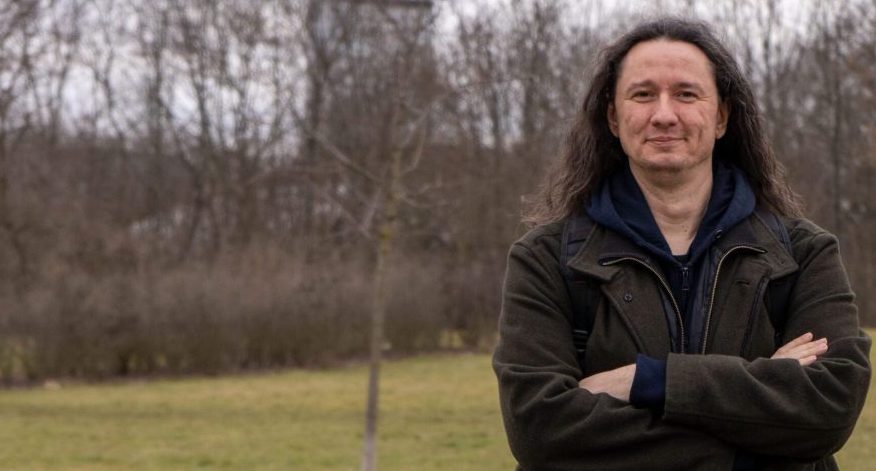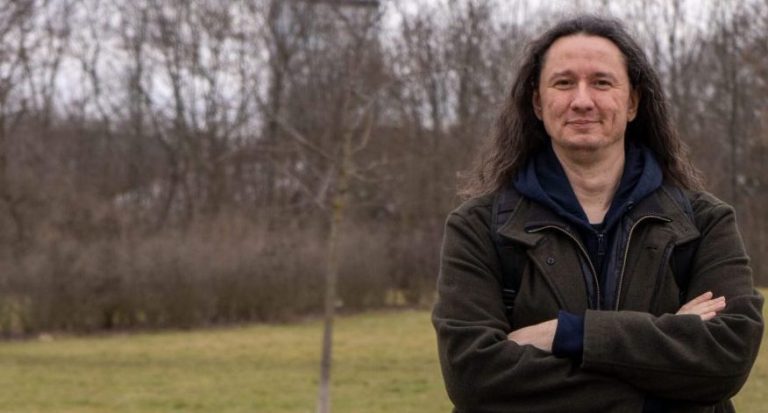Photo: Lukáš Nechvátal (Investigace) 2023-03-06
Photo: Lukáš Nechvátal (Investigace) 2023-03-06
How does a lover of critical thinking turn into someone who runs away from a so-called alternative media outlet once it becomes a disinformation channel? And why is it so hard for so many people to leave the world of conspiracy theories behind? This interview with Anton Smataník sheds light on topics that would otherwise stay hidden behind the opaque curtain of the conspiracy-theory scene.
This article was originally published in Czech on investiagace.cz.
Eleven years ago, you began writing for websites that have been labelled as conspiracy-theory and disinformation outlets. How did that happen? What did you write for them and why?
In 2012 I started a blog on the site tv24.li, which no longer exists. I was approached by the man who would go on to found Slobodný vysielač [Free Transmitter], who asked if I wanted to write articles about politics. I wrote three articles about SDKÚ [the Slovak Democratic and Christian Union party] and three about Smer-SD, which at the time where the strongest political parties in Slovakia. I got the idea that if I put together in one place all their scandals and reminded [readers] of the ideologies they promote that I might help someone not vote for them, [or] avoid them. You couldn’t find information about their individual scandals all in one place; you could just find [information] about individual [scandals], and over the course of 15 years people no longer had an overview.
That was my first journalistic experience, and today I wouldn’t have written those articles any differently. I simply put together the information I had and commented upon it. I saw there was interest in my articles; they were serious things. I wanted to keep writing, but there was nowhere I could do it.
A few months later a magazine was founded called Zem a Vek [Earth and Age], so I applied there as a writer. At first Zem a Vek didn’t have a fixed structure; it was more of a startup. There were only a few staff writers at the editorial office at the time. One of them was the editor-in-chief, Tibor Rostas. It was his project.
This might sound ironic, but my first article for them was about critical thinking. I based it off of university lectures. They published the article. The editors were happy with it and asked me to keep writing.
Were you still a student at the time?
No, I was already working in IT, and I only had time to write on the weekends. It was in the period after the Gorilla protests [which were sparked when the Gorilla corruption scandal broke out], which I took part in. I said to myself that it would be fine to try and help keep people better informed, to somehow contribute to progress.
After that first article, you were offered the chance to continue at Zem a Vek…
Yes. I felt that my writing could help people, so I wrote up another six articles, for which I didn’t want any money, even though later they ended up paying me for them. This included a three-part series about the occult roots of Nazism based on what I thought was an exceptional book that I had read. Then they told me that I have been writing for a long time, and I was pretty good at it, and basically that I could write regularly and for money. After a half a year, I met in person with the editorial office and the editors. Up until that point we had only been in contact online. That was in late 2013.
Why did you want to write there? Why not for a mainstream media outlet?
Before that I used to write blogs and sci-fi and fantasy stories that people liked. You can still find them somewhere. I had a blog on the website of the daily SME, but they had various restrictions. That’s why I started to look for something else. I didn’t have the right education or previous experience so the odds of getting hired by a major media outlet were minimal.
Zem a Vek
Zem a Vek is a Slovak disinformation and conspiracy-theory website and magazine. It is published monthly as a printed magazine. Editor-in-chief Tibor Eliot Rostas has been repeatedly criticized for spreading conspiracy theories and Russian propaganda, misrepresenting facts, improperly citing sources, and using dog whistles to incite hatred toward minorities. In 2019 a court ordered him to pay a fine for disseminating extremist materials, and he was found guilty of the criminal offence of defamation of race, nationality, or creed and inciting national, racial, or ethnic hatred. Zem a Vek also organizes public debates in Slovakia. According to the publishers, the magazine and website are funded by contributions from readers, subscriptions, and proceeds from debates. In mid-2015, however, a recording was leaked of a meeting between Zem a Vek editor-in-chief and co-founder Tibor Rostas, director of Rádio Viva Dušan Budzak, and the then Russian ambassador to Slovakia Pavel Maratovich Kuznecov, where they discussed the possibilities of Russian funding for the magazine. Together with other conspiracy-media outlets, they founded the Association of Independent Media (ANM) in November 2016. The self-proclaimed goal of this organization is to protect its members from attacks from the mainstream media.
You began writing for Zem a Vek, which was a new title at the time and had no publication history. What was the profile of the magazine then?
It was complicated from the beginning. The editorial office was diverse, at first, endearingly alternative. Half of the magazine focused on nature, communities, shamanism, Chinese medicine, meditation, yoga, chakras, some articles were about the legalization of prohibited substances, et cetera. There was never a problem with this part [of the magazine]. Lots of people were interested in it, and it never made for extra-controversial reading. We were simply focused on alternative lifestyles.
And the other part?
That part was much more problematic. They dealt with politics, economics. And that was spiced up with conspiracies […], speculation… All such texts were based on a critical and negative view of Western society. We said to ourselves: “We are part of the West, so we are mainly going to criticize the West, because the mainstream media doesn’t do that too much.”
Was the ideology of the magazine’s management behind that?
I think that the management saw in this orientation more a possibility for making a name, for filling a hole in the market. No one was doing anything like it here, so if we start, we’ll gain readers and market share and will continue to grow. They saw it as a commercial thing. As far as the editors were concerned, we viewed it as an opportunity and a challenge. We wanted to write critically about topics such as the wars in Iraq and Afghanistan, about the destruction of the Twin Towers in New York, about the wars in Libya and Syria, in the former Yugoslavia, about modern slavery in China, and so on.
In this sense, the Czech mainstream [media] is more open than its Slovak [counterpart]. In contrast, in Slovakia there is a great untapped potential for this kind and focus of writing, which attracted us, as a possibility to push the envelope. Which, by the way, was a favourite saying of editor-in-chief Rostas: push the envelope. I recognized that in me, too. Over time though, that kind of approach will deform you, radicalize you.
The editors also drastically shortened my articles, so much so that the objectivity and a certain sense of balance that I worked hard to put in there disappeared. And I never saw them again once they were edited. Supposedly, there was no time for that because of deadlines…
How did it go from there? You became a staff writer…
Yes. I was salaried and got a readership bonus. That was high. At first, the magazine was “only” printed. Then an online version was introduced, where I had lots of leeway because initially very few people wrote for the site. I also prepared background materials and communicated with people who helped promote the magazine. I also administered social media and so forth. But at meetings it was hard for anyone to get a word in. The editor-in-chief had his own ideas, and even though the editors were against [him], he always got his way. It was basically a one-man show. Sometimes we laughed about it. He was completely obsessed. He thought he knew everything better than anyone else…
How long did you stay there?
I started sometime in mid-2013 and wrote until the end of 2014. In early 2015 some of my pieces were published, but I was already gone. During that time, the magazine and the website changed greatly. It was no longer an alternative but more like intentional propaganda. It essentially became that what it was supposed to fight against. Only in reverse.
For example, more and more articles were translated from Russia Today. Before that, we had only translated a few articles from them. When I left, those articles made up the majority. When I would repeatedly ask why we have to do that, the answer was always the same: “Because they write the way we want to.”
Was that after the annexation of Crimea?
Yes. After the annexation things began to change. That’s one reason I left. After the events in Crimea and Donbas, the magazine radicalized and took on an exclusively pro-Russian focus. Before it was at least seemingly balanced. There was no intention of manipulating the public. But not after that. At first, we could go after anyone. We wrote articles critical of Russia, China, the USA, and the EU. After that we became members of just one “camp”: the pro-Russian one. I even heard this sentence uttered: “Now you’re in the right camp, so we aren’t going to write anything negative about them.”
So, the right camp was pro-Kremlin?
All you had to do was read the interviews with ambassadors that were published in Zem a Vek, and it would be clear straight away on whose side we as a magazine were on. Who was favoured and who was targeted. For instance, an interview with the Israeli ambassador was published that was made up of nothing but unpleasant, aggressive questions. It was all arranged so he came out looking negatively. On the other hand, in an interview with the Russian ambassador they were literally lobbing softballs at him. Their grovelling was laughable. After the annexation of Crimea!
Was there any paid cooperation between Russia and the magazine?
That was revealed later, sometime in late 2014, and that was the main reason I left. There was a leak of a recording of a conversation between Tibor Rostas, his accomplice Dušan Budzak, and the Russian ambassador, where they were making arrangements to collaborate. They were practically begging for money. Zem a Vek editor-in-chief and owner Rostas and the Rádio Viva owner Budzak came to the Russian ambassador to offer him the publication of very positive articles about Russia, and they wanted to agree on the conditions. I was horrified by that. I thought that the things they were saying about us and writing about us in other media were nonsense, but as I found out, it was the truth. That’s why I decided to leave. It was high time.
You left, but you didn’t stop writing for conspiracy-theory websites.
I joined Slobodný vysielač. I only did translations there. I wanted to write my own articles, too, but it wasn’t possible. It was mainly an internet radio station. They had a very simple website, and there was no room there for blogs or articles. But translations and stories from news agencies were published on the site, so I got three to four articles every day, and I translated them, prepared them in the editing system, and published them on social media. Back then radio guests included people like Richard Sulík and Martin Klus, and it worked much differently than it does today. It had potential.
How did you get tips for articles for Slobodný vysielač?
From my boss. He’d usually say to look at this or at that, and if I have a problem with anything, to say something, and he’d give me a different assignment. They were mostly American and British sources, sometimes mainstream, other times local media or tabloids. They were mostly interesting articles, even though nearly all of them were very critical of the West. I occasionally tried to come up with my own proposals. At first there was some kind of attempt at balance there.
How long did you last at Slobodný vysielač?
Three months.
Was it a paid job? People often have the idea that this kind of work is done by enthusiasts.
No. I was paid normally. Then one of the founders left, who claimed to me that the other co-owners were telling him what guests to invite to shows and so on. I left with him. They recruited enthusiasts who worked for free. Why pay? And that’s the way it looked over there, too.
Where did you head after that?
I wrote a few articles for Medzičas [Interval], but I got out of there quick. One of the editors, who’s dead now, promised me money but never paid. Then I worked for Konzervatívný výber [Conservative Selection], where most of the topics were not controversial. This website literally created the image of Boris Kollár [a politician and current speaker of the National Council of the Slovak Republic from the Sme rodina party]. They published articles there that ideologically helped form his party. Most articles were against immigration, a topic that the media landscape was full of. Konzervatívny výber was more like a grey zone, where I ended up after backing out of the disinformation scene and wrote about topics that I chose more or less by myself. But there wasn’t much [work] there. They published a few of my pieces, and that was that.
In Prague I also had an interview with the Slovak version of Parlamentní listy [Parliamentary Pages]. I wrote about five articles for them, buy you could see that it was nothing more than a tabloid, so I backed out of that, too. I also sent some older articles to Hlavné správy [Headline News]. That was a clear mistake. I was convinced that I could balance out the content of such outlets. But it didn’t work. Critical thinkers were already rare in this sphere. That environment will grind you up. Either your articles will fall between the cracks because no one is interested, or you’ll adapt. It’s impossible to write objectively, unbiasedly, and critically for these outlets.
Why is it impossible?
Because the readers don’t really want it. People already have it in their heads what they want to hear. If I were to write one day something critical of Putin, the next day something against Biden, and the next against Chinese leader Xi, just to change things up, they would be totally confused, and it wouldn’t work. So, I stopped.
I also wrote for the Czech magazine Šifra [Code], which was a very pleasant period. They published one or two of my pieces every month. I chose only alternative and essentially innocent subjects to write about, ones revolving around philosophy, psychology, history, sociology, and the like. It was a sort of grey area. Maybe a little bit in the vein of another Czech magazine – Epocha [Epoch]. I stopped writing for them in 2018.
Besides Šifra, I also wrote for the scientific magazine Quark. It is a very well-known, serious magazine in Slovakia and as a child I literally ate it up, and today I’m still very interested in technology. I still have some issues hidden away in my parents’ attic. I never could have imagined that one day I’d write for them. But things worked out, and they published five of my articles. Then, I quit this profession.
What were the editorial offices like at the places you wrote for?
You can put the people that work there into a few groups. The first group consists of enthusiasts who have the feeling that some things aren’t covered enough in Slovakia; they are naïve but good intentioned and have an idealist view of the world. Today, there aren’t so many of them anymore. Then there are people who see an opportunity to become famous, to make money, or score political points. Then there are failures who couldn’t make it in other media outlets. They were written off everywhere else, and this was all they had left. And finally, there are individuals who are really not of sound mind.
What would you say to someone who is considering writing for a conspiracy-theory or disinformation website?
I would steer clear of disinformation sites. If you don’t have the right mindset, you don’t stand a chance. The editors there will block your articles, whittle them down. They’ll bully you, and if you don’t acquiesce, they’ll get rid of you fast. They have an aggressive, one-dimensional way of thinking. Today, only a really crazy person or an agent could write for them.
What does the grey area mean to you?
It’s hard to define… The grey area takes some topics covered by the disinformation scene but tries to rework them in a better way to make them reminiscent of mainstream media. Or, in contrast, they take mainstream topics but focus on the extreme aspects. I imagined my role in the media as working in this grey area. That’s the work I’d tolerate.
In hindsight, how would you judge this specific media scene?
Today, it’s essentially a sect. I realized it in late 2014 when I was sitting by myself in a theatre auditorium, before a talk organized by Zem a Vek, and I was listening to a sort of cacophony, very strange music. The first guests were arriving. It dawned on me at that moment. Psychology can explain this thing called the alternative. It’s almost like a cult, and they had come for their pseudo-information emotional drug. The longer you take this ride, the harder it is to get off. Most “members” can’t admit they’ve been tricked. That’s why they continue to flounder about in it. If you want to fight against the disinformation scene, you need to think about the methods they use on cults, and based on that, chose your weapon. The truth won’t help because in that environment emotions play the main role.
Anton Smataník studied informatics and management at the University of Žilina. He works as a programmer and has held the position of team leader. He is from the Slovak village of Kolárovice, located not far from the border with the Czech Republic. He currently resides in Prague. In his free time, he runs, does yoga, travels, reads books, and plays videogames.
Support independent investigative journalism in Czech Republic! You can donate here.
Josef Šlerka has worked as a data analyst and reporter at Czech Centre for Investigative Journalism since 2021. He used to head the Czech Fund for Independent Journalism (NFNZ). He is also the head of the Department of New Media Studies at Charles University in Prague.








